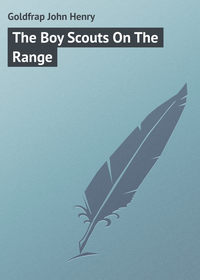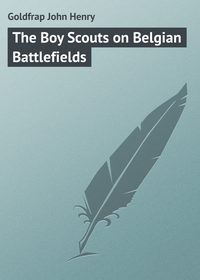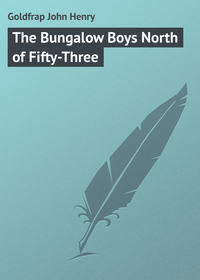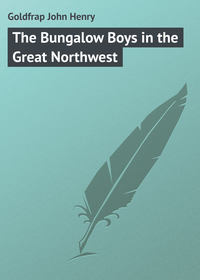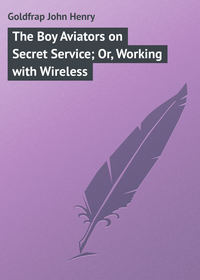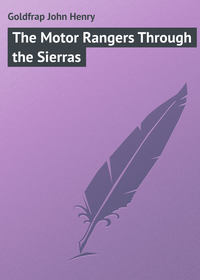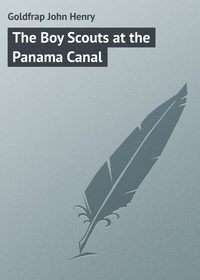 полная версия
полная версияПолная версия
The Boy Aviators in Nicaragua; or, In League with the Insurgents
“Do you intend to submit to being bound or shall I have to order my men to club you down,” he demanded.
The cold brutality of his tone struck into both the boys like a lash across the face.
“We will be bound, if you think that is necessary,” replied Frank contemptuously.
“Yes, I do,” replied the officer, “you see you are very slippery customers and we don’t want you to fly away, señors flies;” and he laughed at his abominable joke in a way that made both boys long to hammer him into insensibility.
Two men – not the two the boys had knocked down, these could not be persuaded to go near them regarding them as “diabolos,” – quickly bound their wrists with green hide thongs and then, at a sharp command from the officer, the men marched off through the jungle. Frank and Harry well guarded by a dozen men with fixed bayonets marched in the middle. No wonder their spirits fell to zero.
There was not a chance of escape.
Rapidly the boys’ brains reviewed the situation. Resourceful as they were they could see no way out of their dilemma. They were fairly trapped. Again and again they bitterly blamed their recklessness in taking any part in the revolutionist’s cause, for the fact that they had been caught red handed in the very act of transferring ammunition from the ship to the shore, would be exactly the circumstance Rogero would seize upon to order their execution. They both realized that. Had it not been for that they could have demanded to see their consul and probably Rogero would not have dared to refuse their request – as it was, however, they were to all intents and purposes revolutionists and their fate at Rogero’s hands they could anticipate all too clearly.
At dawn they were on the march once more, after a brief encampment at about midnight. From this hurry they gathered that the force that had attacked Ruiz was not the main branch of the army but a marauding force sent out by Rogero. They did not question that they were on their way to the latter’s headquarters. What would become of them there they had already guessed. They had little time to act if they were to formulate a plan of escape, – but it seemed maddeningly impossible to frame any scheme, that would hold water when it was conned over.
All day they marched through the steaming jungle. Sometimes they forded chocolate-colored sluggish streams and waded through vile morasses, – where huge alligators slipped from rotting logs into the slimy waters, – or blue herons stood in solemn rows, like an army of ghostly soldiers, – seen among the trees. Then again they issued onto savannahs, on which the sun beat down with a heat that seemed to penetrate the skull. All about them the boys could not help noticing the ravages of the earthquake. Once at an early stage of the march they had asked one of their guards what had uprooted so many trees and caused such widespread damage:
“Terremoto,” he replied with a grunt.
At the word Ben Stubbs and Billy flashed across their minds and the night, that seemed now so long ago, on which they had set out from Plateau Camp. As they passed through villages and noticed the havoc all about, – the masses of ruins and the wretched families huddled upon them, picking over the debris for their buried possessions, Frank’s mind reverted to the Treasure Cliff.
How much was left of the passage, after what had evidently been a terrific upheaval of the land. As he thought of this, and communicated his fears that it was completely blocked to Harry, his hand abstractedly – or perhaps through some association of thought – slipped into his pocket and his fingers encountered the rubies they had wrenched from the sculptured quesals beside the gulf of the White Serpents.
If the worst came to the worst he determined to get them to his father somehow and ask him to give Billy Barnes his share. He did not mention his resolution to Harry for the younger boy was deeply depressed and Frank did not want to add to his troubles by obtruding on his mind any of his fears of what their destiny was to be.
All day they marched on; the half-fed looking soldiers seeming as tireless as mountain mules. With the boys the situation was far different; they were not used to forced marches under a tropic sun, and their legs felt like so many pounds of lead long before late afternoon found them advancing over a broad savannah, at the further side of which they could make out a row of palm trees, and gray-iron roofs beyond them, that somehow looked strangely familiar. Before they had gone many yards further they realized why the place seemed as if they had seen it before. The young officer, who had diverted himself over their capture to such a degree, had strode at the head of the column while they were on the march. Now however he fell back and pointed at the scene in front of them with his sword.
“Greytown,” he said.
“We are to camp there?” asked Frank.
The officer replied with a short laugh.
“No; we shall stay there for some time – particularly some of us,” he added with a sneering emphasis, and looking hard at the boys. “General Rogero took possession of the town two days ago,” he added.
This was serious news indeed to the boys whose only hope now lay in an attack by revolutionists which, while it might not do them any good would at least divert attention from their case for several days during which some opportunity to escape or communicate with their friends might present itself. But with Greytown, – a strong strategic point, – in the hands of Rogero and the government forces the outlook was black indeed.
A short time later they entered the town and marched up the well remembered main street, by the hotel where Rogero had shot down poor Jose and into the dusty barracks, from whence they had seen the troops issue, as it seemed to them years before. With their guard pressing closely about them they were about to pass under the gate when a strange thing happened. A bearded man was pressing through the crowd that had surrounded the barracks to see the soldiers and their prisoners march in. Of all that ragged crowd he was the raggedest; but if Frank and Harry had seen an angel they could not have welcomed the sight more than they did the vision of that tattered, bearded man, – for, under the dust and dirt that covered his face, and his wild gestures, – which seemed to redouble as soon as their eyes met, – the boys had recognized Ben Stubbs!
How he had got there they had of course not the remotest idea nor did they know that his errand in town was to buy food for Billy who was played out by the long trip down the San Juan. It was enough for them that he was there near at hand – the first friend they had seen since they left Plateau Camp. Ben on his part seemed equally rejoiced to see them as, it will be remembered, that neither of the two members of the party, left behind at Plateau Camp, had any idea of whether the boys had ridden out the storm in safety or not.
But Ben was typically cautious. With the cunning of an old adventurer he realized that the present was no time to claim acquaintance. Frank and Harry were about to give vent to a loud exclamation when he silenced them by putting a long, brown finger to his lips. The next minute Ben Stubbs was the most active and the loudest of all the crowd, who tried to curry favor with the government troops by reviling the Americans at the top of their voices. To hear Ben Stubbs talk – of course in Spanish – which he spoke like a native, to see his gestures of hatred and contempt a bystander would have thought that the boys had no worse enemy in the world than this scarecrow tatterdemalion whom the crowd jeered at as “loco” (crazy).
It took some time, in the confusion of arrival at the barracks, to get the troops assigned to their quarters in an orderly manner and, during this interval, Frank and Harry, their faces burning with indignation, had to stand, surrounded by their armed guards, in the center of the court and listen to the imprecations of the crowd against Americans, most of which they fortunately could not understand – or they might have been tempted to risk their lives in one dash at the contemptible ruffians who from a safe distance baited them.
While this was going on Ben Stubbs had disappeared and the boys were at a loss to understand and a little angry at his non-appearance. They were not left long to puzzle over it, however, for, after about ten minutes’ wait in the barrack-yard, the crazy figure came dancing in once more amid the shouts of laughter of the disreputable mob that thronged the open space, and came straight up to where Frank and Harry stood guarded by the soldiers. He had in his hand a roll of Spanish bread and, amid the jeers of the crowd he held it high above his head.
“Maybe the Americans are hungry?” he shouted, “perhaps they want bread. Here is some for the procos (pigs) may it poison them and all such perros (dogs).”
With that he hurled the roll at them and the boys, – divining that some meaning lay behind all this rigmarole, – signed to one of the soldiers to pick it up and indicated that they were ravenously hungry, as indeed they were, not having been given anything to eat since early morning. The soldier sullenly thrust the roll into Frank’s pocket and a few minutes later the boys were pushed into a noisome cell and an iron door clanged to. As the key rasped in the lock they felt that it was like the closing of the world’s doors on them and that they were extremely unlikely ever to see another sunset – unless a miracle intervened.
One thing, however, had been done for which they were thankful before the cell door was shut. The thongs that bound their wrists had been cut. This was an unspeakable relief as the green hide of which they were formed had contracted during the day and they had actually cut into the flesh, – causing excruciating agony.
As soon as their guard had paced away from the cell-door Frank eagerly brought the roll out of his pocket. He broke it open, after first carefully examining it for any signs of writing, and then uttered a cry of delight. Imbedded in the soggy crumb of the roll was a neatly folded bit of paper. With trembling hands Frank opened the screed and, with Harry looking over his shoulder, read as follows:
“Deer buoys:
Noe tyme 2 rite mutch wil say bili & mee is cum down thee rivver in a canoo. Thank heving u air save an soun. Now don u wurri ship matz bili and mee wil see noe harm cums to u. benn Stubbs A. B. (able seeman.)”
It was with difficulty the boys kept back their tears as they read this ill-spelled but true-hearted document. As they sank into a troubled sleep on the bare benches of their cell that night both boys felt that they had a friend at work for them who would die himself rather than not use every effort in his power to help them escape from what seemed to be a helplessly locked steel-trap.
CHAPTER XXVIII.
FACING DEATH
The boys were roughly awakened the next morning, – at what hour they could not judge but estimated that it must be early by the pale light – and a jug of water and a dark brown mess of badly cooked beans, in an earthenware pot, shoved through their bars by the same ill favored guard who had been on duty the night before. Unpalatable as the stuff looked they nevertheless fell on it hungrily, being actually half-starved and seriously weakened by their march of the day before. The momentary exultation caused by the receipt of Ben Stubbs’ letter had evaporated when they awakened and both felt that their prospects were gloomy indeed.
After breakfast they were left in their cell for some time, – the monotony being enlivened by an incident that struck a chill to the already flagging spirits of both boys. The interruption began with a ruffle of drums and then a bugle call. After this there intervened a march and then all was silent for possibly fifteen minutes. Then there boomed out the solemn tolling of a bell and a few seconds later the boys heard, with horrified ears, a sharp command – and then the rattle of a volley. Of course they could see nothing of this, – a blank wall facing their cells and shutting out all view of the barrack-yard, – but from what they heard they could conjure up the ghastly details of the execution as vividly as if they had been present.
It was not long after this, while they were busy with their gloomy thoughts, that a petty officer of some kind, at the head of a file of men came to their cell. The door was thrown open and the boys were handcuffed, – in spite of their protests against the ignominy. With a soldier on either side of them they were then marched across the barrack ground where a depressing sight met their eyes.
A number of soldiers were carrying an oblong box draped in black across the quadrangle. Behind them followed two weeping women and a bent old man. Two children, wide-eyed at what it all meant, – formed the rest of the sad little party. Both boys realized at once with a keen start of repulsion that they were witnessing the last act of the drama whose action they had heard in their cell.
They were marched across the quadrangle, their escort paying no more attention to the sad scene than if it had been an every day occurrence, and up a flight of steep, bare stairs into a long, low room, – down the center of which ran a long table. The table was covered with cheap oilcloth and was littered with pens and paper.
Half-a-dozen men, who were officers to judge by their uniforms, sat at either side of it and at the head was a man whom the boys recognized at once as General Rogero.
His evil eyes gleamed with a sinister glint as they fell on the two boys.
“So, – here we have the young revolutionists, – gentlemen,” he said, turning to the other officers, who all regarded the boys with curiosity but with no more compassion than if they had been gazing at the tortured victims of a bull fight.
Rogero leaned back. He was evidently in no hurry to shorten his triumph. He seemed fairly to gloat over his two prisoners. Frank and Harry returned his gaze fearlessly and after a while the leader of the Nicaraguan forces dropped his basilisk eyes with a shamed and embarrassed expression. The next moment he made up for his temporary lapse by striking the table with his fist and informing the boys that they were before a court-martial.
“By what right do you bring us here?” demanded Frank.
“By the right that we offer every man to get a chance for his life,” was the startling reply.
“What have we done that puts us within the pale of military law?” again demanded the elder of the brothers.
“I presumed you were intelligent enough to know that citizens of a neutral power, interfering in another government’s suppression of sedition, place themselves beyond the protection of their own country,” rejoined Rogero.
“We have not interfered in any quarrel you may have with your unfortunate dependents,” was Frank’s reply, “we are American citizens and I demand the right; if we are to be tried at all, – of a hearing before a civil court.”
Rogero smiled his evil smile once more.
“My dear young man,” he remarked casually, “in the present unsettled state of the country we have no civil courts. The army is the law and the law is vested in the army.”
The other officers chorused their assent. The boys looked desperately about them. No, – there was no means of escape. The windows were guarded and at each door stood a sentry, stiffly at attention.
Rogero instantly divined the purpose of their anxious looks.
“No, Señors, there is no escape,” he sneered, “you see, with two such resourceful young men as you have proved to be, we are taking no chances, – as you say in your country. I am much too anxious to keep you here to think of allowing you to slip through my fingers, as did young Barnes – by your cursed tricks,” he ended furiously, the passion that underlay his suave exterior glaring suddenly on his face.
The next minute he was the same sneering, smiling snake they had always known him.
“But we are wasting time, gentlemen,” he said. “I find there are three charges on the indictment against these unfortunate and imprudent young men, First: – that they conspired with revolutionists against the peace of the Nicaraguan republic; Second: – that they illegally removed a military prisoner from the lines of the Government’s army, and, Third: – that they assisted the revolutionists in their landing on the coast, both actively and by furnishing them with contraband-of-war. The last clause, gentlemen of the court, refers to the possession by these young Americanos of a so-called air-ship, which their father – a well-known conspirer against the Government, – induced them to bring to this country so that it might be used against us on behalf of the revolutionists.”
“That’s a lie,” burst out Frank.
“Save your breath, Señor,” sneered Rogero, with a threatening glance, “you may not have much more left of it.”
“The father of these boys,” continued Rogero, “like all other Americanos in this country, has objected to the taxes that our noble president Zelaya, has wisely put on all articles they export or bring in and naturally therefore is in sympathy with any revolutionary movement. I do not know, gentlemen, what your verdict will be; but, for myself, I must vote for their immediate execution as a solemn duty to my country.”
The boys’ cheeks blanched in spite of themselves. This man then actually meant to put them to death.
“Courage, Harry;” whispered Frank, and he added his slogan of “while there’s life there’s hope!”
“There is one alternative,” went on Rogero, “and that is this, – that these young men at once agree to sign a document assigning to the government of Nicaragua all their father’s property and forward it to him for his signature by a messenger I have waiting. If Señor Chester the elder will pay this ransom these foolish boys may go free, otherwise – ” he gave an expressive gesture the meaning of which was only too plain to need translating into words.
There was a hurried consultation, of what was called, by a ludicrous travesty, the “court-martial,” and then the members reconvened. One of them arose and, addressing Rogero who had assumed his seat at the head of the long table, said:
“What you have proposed is agreeable to the other members of this court-martial, General.”
“Then your verdict, gentlemen, is?” demanded Rogero.
“Death by shooting,” was the reply that sent an involuntary shudder through the boys.
Rogero smiled his evil smile again – twice as menacing in his triumph. “You, however, agree to offering them my alternative,” asked Rogero anxiously, “La Merced is a rich plantation and so is that of Don Pachecho adjoining it; which I don’t doubt we can easily acquire when we have established headquarters at La Merced.”
“Of course we agree to your alternative, General,” replied the other officer, “as to what you say about Don Pachecho’s estancia, however, we can doubtless assimilate that with little difficulty. General Ruiz, his son-in-law, is dead – ”
“And he left a remarkably pretty widow,” put in Rogero, “really I am in quite a hurry to establish headquarters near such a charming neighbor.”
“I was going to say,” resumed the other, “that as General Ruiz is dead we can naturally claim his property for the government as that of a revolutionist.”
This cool proposal met with great applause, induced, in a large measure, by the fact that each officer saw in his mind’s eye himself being awarded the property. Rogero, more comprehensive, had already mentally claimed it all for himself.
“You have heard the alternative, prisoners?” snapped Rogero, who had now quite dropped his mask of sardonic politeness, “What do you say?”
“I say that if we are to die we will die as American boys should, and accept no such disgraceful terms,” proudly replied Frank.
“And I, that we should be as bad sons as we would be unworthy citizens if we even considered your dastardly proposal,” exclaimed Harry.
“Very well, you have signed your own death warrants,” bitterly replied Rogero. “In a few days we shall have captured La Merced in any event, and I shall have much pleasure in informing your father of how his two promising youngsters died.”
It was well for Rogero at that moment that the boys’ hands were manacled. It was perhaps as well for every one in the room that they could not strike a blow. For to such a pitch of fury had the sneering words of the dark-skinned man before them aroused them that had they been free it would have cost him dear.
“For the last time I ask you?” demanded Rogero, “will you accede to my proposal?”
“For the last time no – not if it was to save our lives ten times over,” replied Frank.
Rogero moved over to a window that overlooked the quadrangle of the barracks.
“I shall have an excellent view of your deaths from this window,” he remarked, “and I assure you that nothing I have seen for a long time will give me more pleasure.”
“Not even your murder of Dr. Moneague in New York,” – quietly retorted Frank.
The effect the boy’s remark on Rogero was electric. His brown face seemed to turn a sickly green.
“You American dog – for that, if I could inflict a thousand deaths upon you, you should die them all, one by one,” he fairly shouted.
“Take them away,” he bawled to the soldiers, who stood staring open-mouthed at the sight of his maniacal fury. “Take them away and shoot them down, before I run them through with my sword.”
Frank smiled with a bitter contempt. If he had ever felt any doubt as to Rogero’s guilt he was convinced of it now. He was beyond a question the murderer of Dr. Moneague. His own fury and consternation at Frank’s quiet remark had convinced the boy. As the boys were led out Rogero stood at the window. They could see that he was shaking and muttering to himself as if in terror. At that moment a huge bat, that had been hanging to one of the rafters of the room, which was unceiled, flopped heavily down and nearly struck him in the face. Rogero reeled back with what was almost a scream of horror.
“Vampiro,” the boys heard the soldiers say, showing almost as much horror as had Rogero at the sudden apparition of the animal, – which had now flopped heavily off again into some other recess. They did not know then that in most Central American countries the vampire is regarded as an evil spirit and carries the menace of death on its leathern wings, as well as its reputation as a blood-sucker.
CHAPTER XXIX.
FRIENDS IN NEED
The boys touched each other’s manacled hands, – to effect a handclasp was impossible, – as they passed down the stairway. Now that it seemed all over they felt strangely calm. They were determined, at all events, to show no sign of flinching when the crucial moment came. Till that time they both determined to keep up stout hearts.
“Ben Stubbs and Billy won’t fail us if its humanly possible to get help,” said Frank.
“But how are they to storm a whole garrison,” demanded Harry despairingly. His contention did indeed seem unanswerable and, till the boys and their guards had reached the center of the courtyard, no more words were exchanged. A command to halt was abruptly given by the officer in charge and the boys were led over toward the blank wall, – on the other side of which lay the cells, one of which they had occupied the preceding night.
The men who had led them there then shackled their ankles and produced two long bandages of cloth. The boys saw at once that these were intended to blindfold them with. Both gave a shudder of repulsion.
Their signs of objection were noticed by the officer who, rightly interpreting them, ordered the men not to tie the bandages on. Apparently he thought that at such a moment an exact compliance with regulations didn’t matter.
At the last moment Frank suddenly thought of the jewels in his pocket. There was only one thing to do and that was to trust to the honor of the officer in charge of the firing squad. He had not a bad face and even seemed disposed to be friendly to what small extent he could. Frank, with his head, beckoned to him. He hurried up.
“Can you speak English?” asked Frank.
“A little;” replied the officer.
“At least you can understand what I am going to say,” replied Frank “you consider a dying promise a solemn one.”
The officer nodded his head.
“I have something to send to my father after I am dead and I am going to entrust you with the commission,” went on Frank, “will you promise to carry it out faithfully?”




